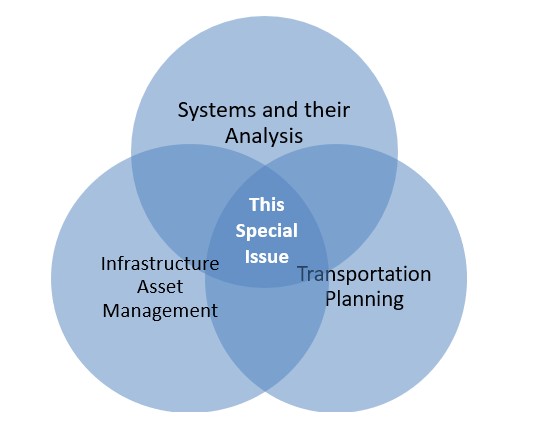Submit a Manuscript to the Journal
Civil Engineering and Environmental Systems
For a Special Issue on
The Interconnectedness of Transportation Infrastructure Decisions
Abstract deadline
01 June 2024
Manuscript deadline
01 January 2025

Special Issue Editor(s)
Xi Jiang,
Department of Civil and Environmental Engineering, The Hong Kong Polytechnic University, Hung Hom, Kowloon, Hong Kong
[email protected]
Daniel van der Walt,
Department of Civil and Natural Resources Engineering, University of Canterbury, Christchurch, New Zealand
[email protected]
The Interconnectedness of Transportation Infrastructure Decisions
Why
The public has high expectations for reliable and well-maintained pavements, tunnels, and bridges, and also for well-planned transportation systems with fair and efficient operation.
Who
Those who need to meet these expectations include state and local departments of transportation, and the planners, engineers and contractors responsible for managing transportation assets and the operation of transportation systems.
The Systems Challenge
Given the complexity of managing current assets and planning future operations for transportation systems, the challenge of integrating the two becomes the point where the state-of-practice needs systems advances. Social goals such as resilience to climate change, improved public health, and decarbonisation of transportation require concurrent multi-disciplinary thinking.
Advances in systems analysis and systems thinking need to be shared to advance our state-of-knowledge in multiple fields for example infrastructure asset management and transportation planning depicted below.

How – Aims and Objective
This Special issue aims to explore the interconnectedness of transportation infrastructure management systems and how they address the practicality of planning, design, policy, construction, inspection, maintenance and rehabilitation decisions.
The primary objective of this Special Issue is to present new research and demonstrations of methods that take a systems viewpoint to decision analysis. By integrating innovative approaches, we aim to enhance the efficiency and effectiveness of managing transportation infrastructure and capture the practical reality of decision-making for developing and managing transport assets.
Scope
Papers we consider in scope will have one or more of the following characteristics:
- Interconnectedness between different systems for example tunnel, rail, roading systems, or
- Interconnectedness between different phases of system analysis-- capital, operations, and maintenance systems
- Interactions between multiple approaches to evaluate infrastructure decisions (e.g., life-cycle costing, health impacts, environmental impacts, social impacts, land-use planning, safety and technology, social change)
- Consequential impact of technology advances from Smart infrastructure and Digital Roads on land use planning, ethics, strategy, and changes in user preference.
- Focus on how systems perspectives add to the analysis of resilience in transportation decisions.
- Emergent properties in transportation infrastructure systems (e.g., resilience, self-organisation, adaptability)
- Consideration of systems fundamentals in transportation infrastructure (e.g., components and their interactions, boundary, representation, feedback loops, unforeseen consequences)
- Case studies examining the use of systems-focused concepts or approaches for transportation infrastructure.
Examples of topics within this scope are:
- Limiting unforeseen consequences from climate adaptation efforts.
- Analysing the interrelations between policy options and user adaptability.
- Systems-level metrics for assessing transportation infrastructure performance.
- Effective oversight in the use of advanced algorithms and big data sets for structural health monitoring.
- Use of systems analysis to reduce the risks of negative social impacts from infrastructure strategies.
- Evaluation of how the use of smart infrastructure technologies can improve maintenance decision-making.
- Value of baseline system descriptions for future evaluation of the impact of change.
- Integrating user satisfaction data and traffic information to assess transportation infrastructure system performance under a changing context.
- Improving maintenance and rehabilitation strategies by including interconnectedness and interaction.
- Use of systems thinking or modelling to develop better infrastructure management policy.
Looking to Publish your Research?
Find out how to publish your research open access with Taylor & Francis Group.
Choose open accessSubmission Instructions
Authors are encouraged to submit original research articles, review papers, or case studies that contribute to the advancement of decision-making process of transportation infrastructure systems. All submissions will undergo a rigorous peer-review process to ensure the highest quality of published work.
Expressions of Interest and Abstracts for Review (Optional): 1st June 2024. A Word file with guidance on the appropriate style will be provided to those who submit an expression of interest or provisional abstract.
Expected publication date: May 2025.
Select "Transportation Infrastructure Decisions" when submitting to ScholarOne.
To increase the impact of these practice-oriented articles, we expect (but do not require) authors to pay the fee for open access publication.